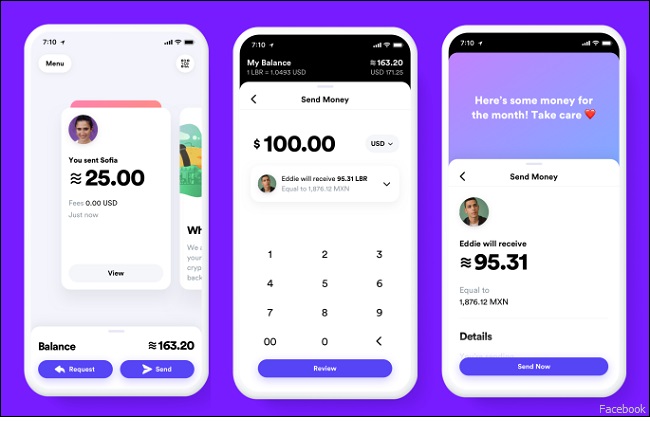
|
|

|
|
| April 20, 2024 |
|
Facebook and 28-company coalition to launch global digital currency 
SAN FRANCISCO--Facebook is going into the banking business.
The social networking company on Tuesday said it plans to help launch a digital currency in 2020, marking one of the company’s most aggressive moves yet to push beyond digital advertising. A new nonprofit group based in Geneva, the Libra Association, will oversee the currency, called Libra. It will initially be backed by Facebook’s expertise but governed by 28 founding partners including payment firms Visa and Mastercard and internet companies eBay, Spotify and Uber. Facebook said that it wants the currency to be available starting the first half of next year and that it believes many of the 2 billion people who are already on the company’s services will one day regularly use the new currency to buy things or send money internationally. “The motivation for this is to effectively enable a simple global currency and financial infrastructure that empowers billions of people,” Dante Disparte, head of policy and communications for the Libra Association, told NBC News. The project would bring a consumer-friendly version of digital currencies to smartphones around the world, potentially creating a way for people to easily transfer money, build credit and pay bills while avoiding costly fees. Libra is open source, meaning any company or person can build a business within its framework. For example, a consumer could buy some Libra using dollars and save them in a digital wallet. That Libra could then be sent to a family member via WhatsApp messenger or used to pay a bill in a foreign country without having to worry about an exchange rate. The project is the biggest step of any major corporation into the emerging realms of digital currency and blockchain technology, representing a vote of confidence that experiments in new forms of digital payments could be more than a passing fad. Blockchain is a decentralized system in which computers each contribute to a shared public ledger, allowing for secure transactions without a central authority. Libra, named partly after a Roman unit for weight and currency, will have echoes of bitcoin, the popular cryptocurrency, but also some key differences, most notably that it will be governed by a central authority and that its value will be tied to other assets. Facebook said it plans to offer financial services, possibly one day including loans, through a new subsidiary that specializes in Libra. Facebook said it would keep data about people’s financial transactions separate from data about social networks, so that Libra information would not be used to target advertising on Facebook or Instagram. Libra will not be exactly like bitcoin or other so-called cryptocurrencies that began emerging a decade ago. Cryptocurrencies are known for their decentralized nature, existing outside any central authority such as a government or large, corporate association. And the Libra value will be pegged to a reserve of real, low-volatility assets, making it relatively stable compared to the notoriously fluctuating value of bitcoin, according to Facebook and the Libra Association. The reserve, or “basket,” will have assets “like bank deposits and government securities in currencies from stable and reputable central banks,” Facebook said. The Libra could be useful to people who don’t have easy access to banking services or cash, such as people in crisis immediately after a natural disaster or other unstable situations, said Pete Lewis, a spokesman for Mercy Corps, a humanitarian organization that signed up as one of the 28 founding partners for the Libra Association. “A low-volatility currency could provide financial stability for people struggling with conflict,” Lewis said in an interview, adding that the Libra could give people an alternative to currencies that are experiencing hyperinflation in a crisis. Facebook investors and others who watch the company closely have expected the company to consider a digital currency or something like it since at least May 2018, when the company opened a division to focus on blockchain, the technology that makes cryptocurrencies possible through records kept on far-flung computers. Transactions made with Libra will be recorded in a blockchain designed to handle billions of possible accounts, according to a 12-page white paper outlining the plan. Facebook engineers designed the blockchain, but the technology will be open-source, meaning others may contribute to it, the white paper says. Central to the thinking behind Libra is that a wide array of companies, not just Facebook, will be involved in decision-making and begin offering for-profit services related to the currency, Disparte said. “This will start to develop a wave of responsible financial innovation,” he said. Facebook said it plans to begin offering accounts next year through a new subsidiary called Calibra, echoing the name of the new currency. Calibra will be a digital wallet that will allow people to send money in the form of Libra “at low to no cost,” the company said. Calibra will be integrated into through Facebook’s WhatsApp and Messenger services. WhatsApp and Messenger are central to Facebook’s future, as CEO Mark Zuckerberg tries to respond to a shift in how people spend their time, away from public news feed posts toward private messaging. “We want sending money to be as easy as sending a text message,” Kevin Weil, vice president of product for Calibra, said in an interview. Initially, “the whole goal will be around driving adoption,” he said. “If we’re successful at that, we think there will be other opportunities to provide financial services to people that would be a business to us.” Disparte said that the Libra Association wants to have 100 organizations as partners by the time the digital currency debuts. Each of the partners will have equal voting power, although Facebook “is expected to maintain a leadership role through 2019,” according to the white paper. Facebook is offering employees working on Libra the option of being paid in the currency, The Information, a tech news website, reported this month. (Source: NBC News) Story Date: June 19, 2019
|